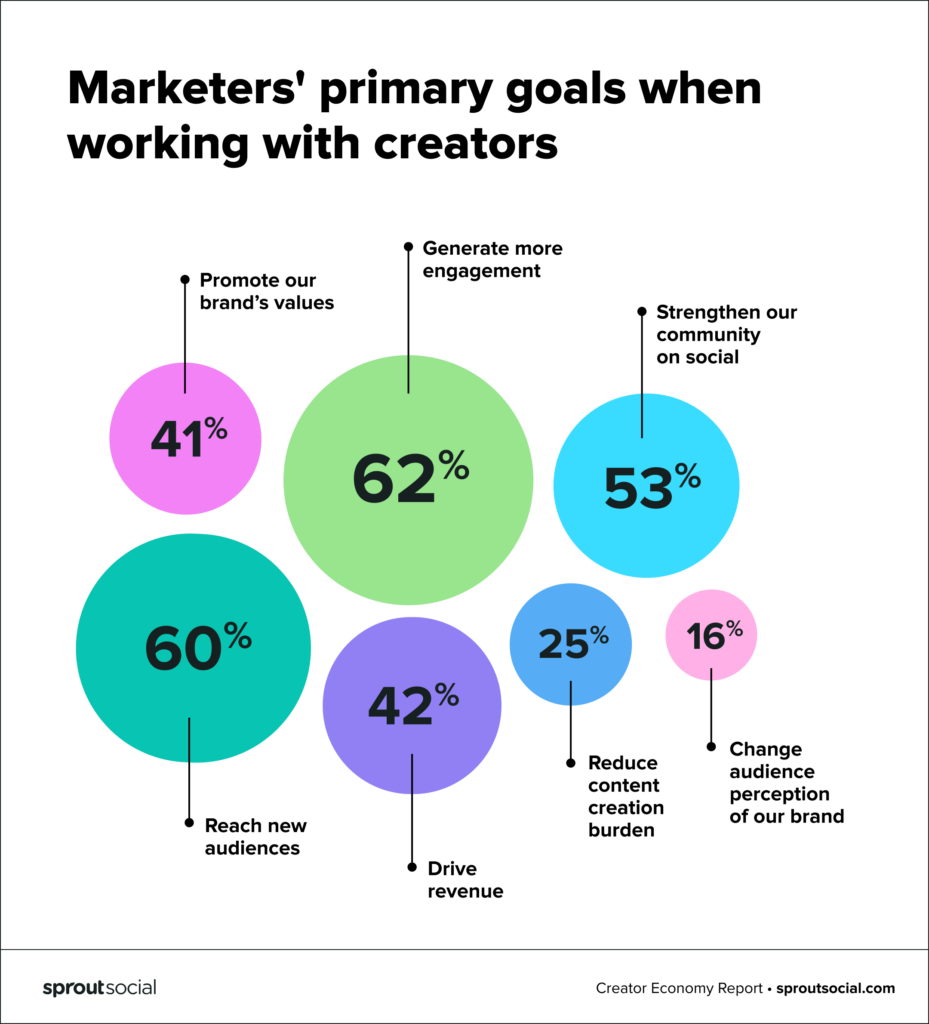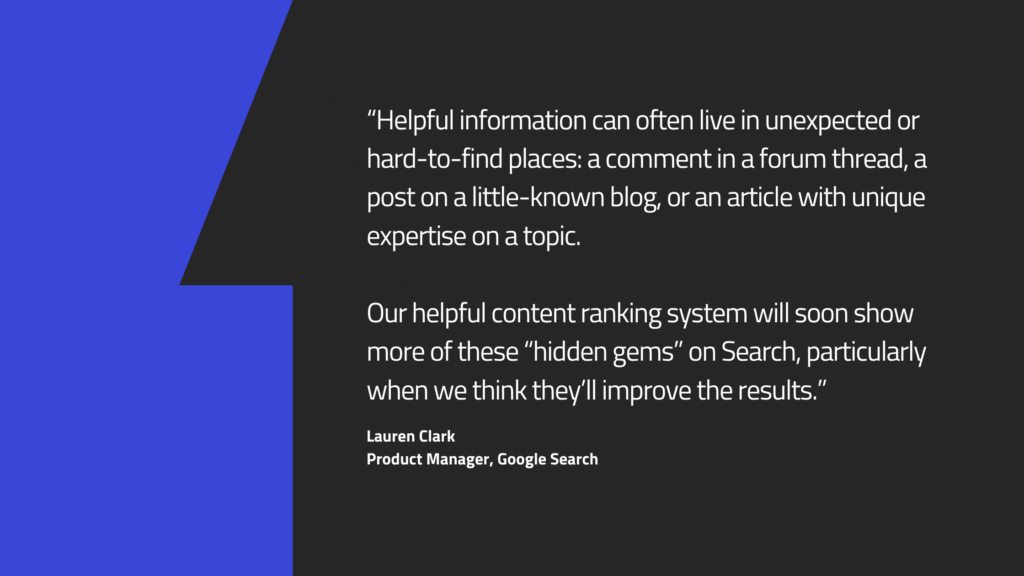Fact: Most people would prefer to learn about your products and services from other consumers who’ve used them – and love them.
Due to this demand, an estimated 90.3% of US marketers will leverage influencer marketing in their strategies within the next five years. There’s an assumption that UGC is for the young. However, influencer marketing doesn’t just resonate with younger demographics – 63% of internet users of all ages have engaged with a sponsored influencer post at some point.
As consumers want more authentic content based on actual experience with products and services, SEO and influencer strategies are beginning to converge. Here’s an insider perspective based on our team’s real-world experience blending influencer and SEO strategies into a symphony of success.
Jump To:
The building blocks of SEO
Fluency in SEO isn’t a prerequisite to effective influencer marketing, but some basic knowledge certainly helps. Here are a few definitions of key SEO terms and concepts.
Page and Site Authority
Search engines work to provide the most relevant and trusted content to users. They assign a score to every website and webpage, using quality signals to calculate that score. Those scores determine what content ranks where on a search engine results page. The higher the score, the higher the site authority, which makes it more likely to get either the top spot or one of the top spots on the first page of search results.
Keyword Usage
Keyword usage practices in SEO have changed over the years. Where it was once encouraged to use keywords as often as possible in any piece of content, search engines have evolved and now consider that practice something akin to spam, which can hurt SEO rankings. Rather than keyword stuffing, strategic keyword, and keyphrase placement on a page promoting your product has proven much more effective.
Site Crawling
This is when search engine bots, also known as crawlers, pore through the code on your website to figure out what each page is about. After crawling, these bots index the page in a search engine under specific keywords so it’s easy for users to locate.
Quality Signals
These help search engines determine whether a site will offer a good user experience. There are around 200 quality signals search engines use. However, some are more significant than others, such as how many links a site has from other high-authority sites, content quality, mobile-friendliness of a site, loading speed, and how much time users spend on your website.
These are essential concepts regarding influencer marketing because influencers alone don’t directly control rankings. Yet, influencers can drive signals like engagement and authority that elevate Search ranking potential.
Savvy brands align SEO and influencer efforts for maximum impact. Here’s the state of influencer marketing going into 2024.
The rise of influencer marketing
Influencer spending will surge from $4 billion in 2022 to over $6 billion in 2025. And it’s not just direct partnerships fueling growth:
- 68% of brands plan to increase their influencer marketing budgets
- Brands leveraging social commerce strategies attribute 29% of their sales to social commerce
- 42% of B2B marketers plan to use influencer marketing.
- Nano-influencers with under 10K followers drive 2x the engagement of macro-influencers
But it’s not just brands adopting influencer marketing. Consumers, especially Gen Z and Millennials, look to influencers for guidance:
- About 57% of Gen Z and Millennials have bought a product based on an influencer recommendation
- Gen Zers and Millennials who said they trust social media influencers grew from 51% in 2019 to 61% in 2023
Brands are taking note and turning to influencer marketing to drive authentic connections with target audiences.

Influencers’ indirect impact on Google Search rankings
In a recent YouTube video, Amsive’s Senior Director, SEO & Head of Organic Research, Lily Ray, reviews several Google updates that provide clues that influencer content and social proof will indirectly play more significant roles in SEO outcomes moving forward:

The “Perspectives” Filter
In early 2023, Google introduced “Perspectives” as a part of Google I/O. “Perspectives” either appears as a filter or directly in search results and surfaces social media content intending to showcase diverse, authentic perspectives and commentary from real people on platforms like YouTube, TikTok, Reddit, and Quora. Google is recognizing that certain queries are best answered with unique/specific perspectives from different people, such as influencers or creators, rather than solely branded content.
E-A-T Becomes E-E-A-T
In December 2022, Google updated its foundational E-A-T acronym to E-E-A-T. The new “E” stands for experience. Google wants to surface first-hand, experiential content better. Influencer-created content built on real-world and real-human testing and reviews provides the type of “experience” Google wants to see.
“What that ‘E’ is looking to do is to elevate content where first-hand experience really provides a better result.”
Lily Ray, Sr. Director, SEO & Head of Organic Research
As Google navigates continual algorithmic updates, it’s clear that it is trying to, albeit imperfectly, figure out how to weigh in these experience factors from influencers, creators, and social media.
Authorship and Knowledge Graph
Google continues refining how it displays authorship and expertise in search results. The Knowledge Graph is a database Google uses to connect facts and information around key people, places, and topics. For example, for authors and influencers, the Knowledge Graph compiles available data like credentials, past published work and content, bio details, and areas of expertise.
Robust Knowledge Graphs and authorship profiles establishing credibility hold value as Google analyzes how users engage with them. That’s why brands should ensure their influencer partners have optimized public profiles that showcase their authority.
“Curating influencer content will likely soon be key for E-E-A-T.”
Lily Ray, Sr. Director, SEO & Head of Organic Research
The Rise of Short Videos
Consumers increasingly want video perspectives, reviews, and commentary from influencers instead of static text articles from their search experience. There are a few reasons for this:
- 80% of shoppers who watched a YouTube video related to a planned purchase said they watched it at the start of their shopping process
- YouTube creators achieve a 50% engagement rate, indicating strong audience affinities and influence
- Short videos allow influencers to showcase products visually in real-life situations
- Video content is perceived as more engaging, authentic, and entertaining than text by many users
Influencers have recognized this consumer demand and are heavily focused on short videos across YouTube, TikTok, Instagram, and more. For brands seeking visibility and reach in this highly increasingly influential video landscape, focusing energy on collaborating with relevant video influencers is key.
Social Followers Front and Center
Google is testing showing influencer follower counts directly in search engine results pages (SERPs). While not an official ranking factor yet, this indicates that social popularity and community-building are becoming pillars of authority and trust signals:
- Influencers with larger, more engaged followings are perceived as having greater clout and expertise
- Highly engaged influencer social content can help improve click-through rates from search engines
- Active social sharing and engagement with influencer content can signal its relevance for specific topics
Even though the follower counts aren’t direct Google ranking factors, brands can still benefit indirectly by ensuring their influencer partners have strong followings and engagement. Marketers should factor this into partnership decisions and content promotion strategies.
How to optimize your influencer content
Through its innovations, Google has made it clear that authoritative content intersects social influence and community engagement. While influencer impact on rankings is indirect, partnerships can drive engagement, authority, and trust signals that matter for SEO. Brands should take an integrated approach to influencer marketing and SEO:
- Develop always-on influencer partnerships. One-off campaigns are not enough. Cultivate lasting relationships with niche micro-influencers and experts to fuel ongoing content and optimization ideas.
- Coordinate integrated content strategies. Ensure influencer assets optimize for keywords and topics as well.
- Encourage backlinks. Backlinks, or any inbound link from a different site, significantly impact site ranking. When an influencer features your product or brand or includes a link to your website on their social or website, engagement and exposure follow. Plus, when influencers create content and link to your site, this results in a high-quality backlink for your site…which increases the likelihood of others sharing your link. That popularity growth means your chances of high-authority websites picking up your link grow exponentially.
- Build internal influencers. Turn passionate employees into influencers themselves.
- Monitor optimization for E-E-A-T. As Google evolves its algorithm, ensure content provides strong experiential signals.
- Leverage video content. Align with video influencers to bolster reach and visibility.
Authenticity is essential – and influencers provide that authenticity at scale. There are enormous opportunities for brands that embrace this convergence. The future favors those who recognize that influencer marketing and SEO are now intrinsically linked. Brands that optimize and amplify their influencer content using these tips will see their authority, trust signals, and, ultimately, their conversions surge over competitors.
Learn more about this connection from the SEO perspective:
Video: 5 Ways SEO is Moving Toward Influencer Marketing
As influencer marketing and SEO continue to converge, brands have an immense opportunity to drive real business impact. Companies can gain an edge over competitors by taking an integrated approach that leverages influencers’ authenticity and social proof to elevate optimization and rankings.
Brands that embrace this new influencer-driven SEO reality with creative strategies and always-on influencer partnerships will see their authority, trust signals, and conversions surge. The future favors those who recognize that influencer marketing and SEO are now intrinsically linked. The brands that capitalize on this convergence to provide value to their audiences will reap the rewards.
Exploring the latest social apps is only one part of a data-centric, performance-driven strategy, giving you the power to know and do more. Dig deeper into Meta’s Threads app, or let’s talk about how to achieve more for your marketing — and your business.






